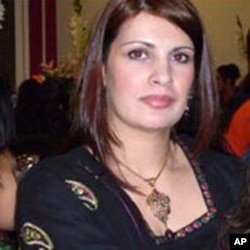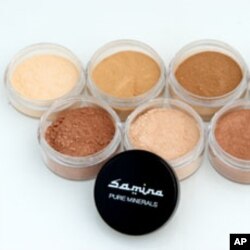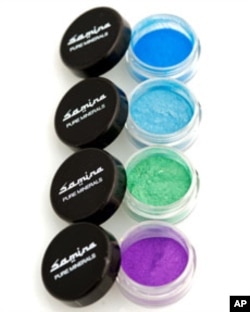A mother of five from Birmingham, England has launched her own line of halal cosmetics. Samina Akhter started her cosmetic and personal care line because she was disturbed by some of the ingredients in over-the-counter products. Akhter is hoping her line will appeal to non-Muslims as well as serve the needs of her own community.
When you open the website, saminapuremakeup.com, a flash movie featuring several beautiful models greets you. All the women have flawless, smooth skin, moist lips, and alluring eyes. Midway through the movie a model appears in a head scarf, but that is one of the few clues that the product line appeals to Muslim women.
One of the images features the text free from animal and alcohol content (non-haram) which is the first clue to what's different about this cosmetic line.
Samina Akhter, a British-born Muslim, started her own cosmetic line when she became concerned that some of the products she was using violated her faith. She told VOA that she was worried that some of the animal by-products she could not eat were in her former cosmetics.
"It did come to light that a lot of the products were sourced or did contain certain animal by-products," she said. "Or sometimes it was not very clear; it was very, very gray; it wasn't very easy to identify either"
"Certain ingredients or certain products could mean that it has come from an animal source or it could also mean that it has come from a plant source. So there's a lot of uncertainty in the products; you are not really sure," she added.
Questionable contents
Pick up a bottle of shampoo, a stick of deodorant or lipstick and - if you can get past the multi-syllabic names on the label - you will see a number of compounds derived from animals, including pigs - which are considered haram or forbidden, versus halal, or permissible, under Muslim dietary laws.
One of those ingredients - stearic acid - is taken from the stomachs of pigs, and the rendered fat of cows, and sheep. Other ingredients - including collagen and hyaluronic acid found in anti-aging creams - can come from pig or cow placenta. Keratin, used in hair products, comes from animal hooves, nails and hair.
Samina Akhter was concerned that these products violated her faith. She also refuses to use alcohol in her products and will not allow animal testing for any of her line.
But Akhter is not the only person concerned with what is in cosmetics. Stacy Malkin is the communications director for the U.S. Campaign for Safe Cosmetics. She told VOA that many personal care products also contain preservatives - called parabens - that act like synthetic estrogen in the body.
She says elevated estrogen could have serious consequences for women, including elevated risk of breast cancer. The longer a woman is exposed to estrogen throughout her life, the higher her risk of breast cancer. So if a woman goes into puberty earlier or menopause later, her body's producing more natural estrogen, and if a woman is exposed to synthetic estrogen that is also a concern," said Malkin.
Product safety
The issue of cosmetic safety has even reached U.S. lawmakers in Washington, where Representatives Jan Schakowsky of Illinois, Ed Markey of Massachusetts, and Tammy Baldwin, of Wisconsin - all Democrats - introduced the Safe Cosmetics Act of 2010 in July.
The law would give the U.S. Food and Drug Administration more authority to regulate cosmetic ingredients. Current law allows the $50 billion-a-year U.S. cosmetics industry to self-regulate. But the law dates to the late 1930s. Schakowsky says her legislation is meant to make personal products safer.
"Think of all the products we use: shampoo we wash our children's hair with it at bath time, or the spritz of perfume, or the splash of after shave or an application of lipstick. Yet for all the thousands of products that are on store shelves, only a fraction of their ingredients have been assessed for safety. So it's clear that our cosmetics laws are woefully out of date, Americans are at risk of being unknowingly exposed to harmful chemicals, but the Safe Cosmetics Act finally addresses those critical concerns," she said.
Wide appeal
While she designed her product line for Muslim women, Samina Akther says that her methods have a wider appeal.
"It is a new trend to be honest," she said. "A lot of people are becoming more and more conscious of what they are putting on to their skin. A lot of people are choosing to go for brands that have a more ethical view and eliminate those kinds of [toxic] products.
Cosmetics and related products sold more than $2.1 billion in the Middle East according to Meese Frankfurt, a company that runs trade shows worldwide, including one in Dubai. Currently, Samina Pure Minerals cosmetics are only available on the Internet through the company's website. However, Akhter says she hopes to increase her market share and feature her cosmetics line in stores.
In the U.S., halal cosmetics are not new, but they are experiencing a revival of sorts. Revlon has added at least two hair color products - Colorsilk and Colorsilk Luminista - that are certified halal. Tom's of Maine - which markets to consumers looking to avoid toxic chemicals - has had halal certification since 2006. For her part, Samina Ahkter says she hopes her cosmetics line will help women - Muslim and non-Muslim - feel good about what they put on their bodies.












